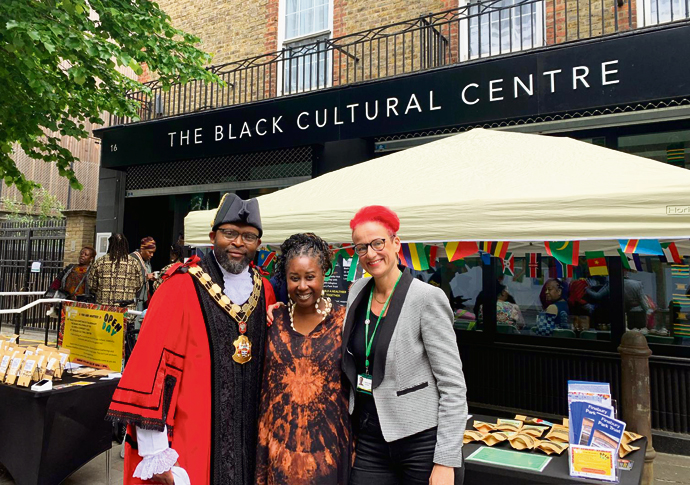‘More than just sticking plasters’
Centre’s health hub offers ‘culturally competent’ space with medics and holistic practitioners
Friday, 13th June 2025 — By Daisy Clague

Anna Nije
A NEW hub at Holloway’s Black Cultural Centre is bringing medical doctors together with holistic practitioners to provide a “culturally competent” space for people of colour to access health services.
The Black Health Hub is a weekly series of workshops that aim to reach people from the global majority – the majority of the world’s population who are not white.
It is run by Go Africa, the organisation currently in residence at the Black Cultural Centre, whose founder Anna Nije explained: “There are not many places where you can talk about health, or what is culturally appropriate for your health. The GP will talk about what is medically acceptable and scientifically proven in a conventional medical way, but we also want to give access to holistic, plant-based products that many people are using at home, but not necessarily sharing publicly.”
The idea, Ms Nije said, is to give holistic medicines more credibility and create a health-related space where people from the global majority feel safe to go to.
Ms Nije decided to create the Black Health Hub after learning that there was a slower take-up of the Covid-19 vaccine among global majority communities.
“People watch things online or speak to their people back home saying not to trust it, because of [global majority communities] being guinea pigs for pharmaceutical companies and scientists in the past.”

The Black Cultural Centre in Holloway
These and other experiences of race-based trauma are often dealt with by “sticking plasters”, rather than through methods that “actually support them and allow them to empower themselves”, added Ms Nije.
There will be something for everyone at the hub, including smoking cessation support, race-based trauma and mental health group counselling, natural products from Ghana Fresh, diabetes testing from Public Health Islington and many other services.
There is a particular focus on diabetes, which disproportionately affects people of Black African, African Caribbean and South Asian ethnicities, as well as dedicated days for women’s and men’s health.
Ms Nije added: “Diabetes in our community is high.
“We like sugar – we would typically take six sugars in a tea. So when I’m making someone a cup of tea I ask them, ‘Do you want an African portion or an English portion?’
“Foods like pounded yam, plantain – it’s so important that people understand you have to eat these things in moderation if you want the rates of diabetes to go down. It’s about what we can do to help ourselves – in how we’re cooking, what we’re eating – as well as the conventional medicine.”
Having diabetes specialists at the hub “right there to talk to them” makes the support more accessible to people who might otherwise have been avoiding or not known how to get the help they need.
And it doesn’t matter what ethnicity the practitioners are, Ms Nije added.
“The fact is that we’re creating an environment where they can trust people who don’t look like them. It’s about everybody learning and embracing our culture and breaking down barriers of discrimination and isolation.”
Monday, June 16 will be a Women’s Health Day, where visitors can drop in all day for free to a range of different sessions including cancer screenings, sexual health support, herbal therapies, tai chi and a self-love workshop.